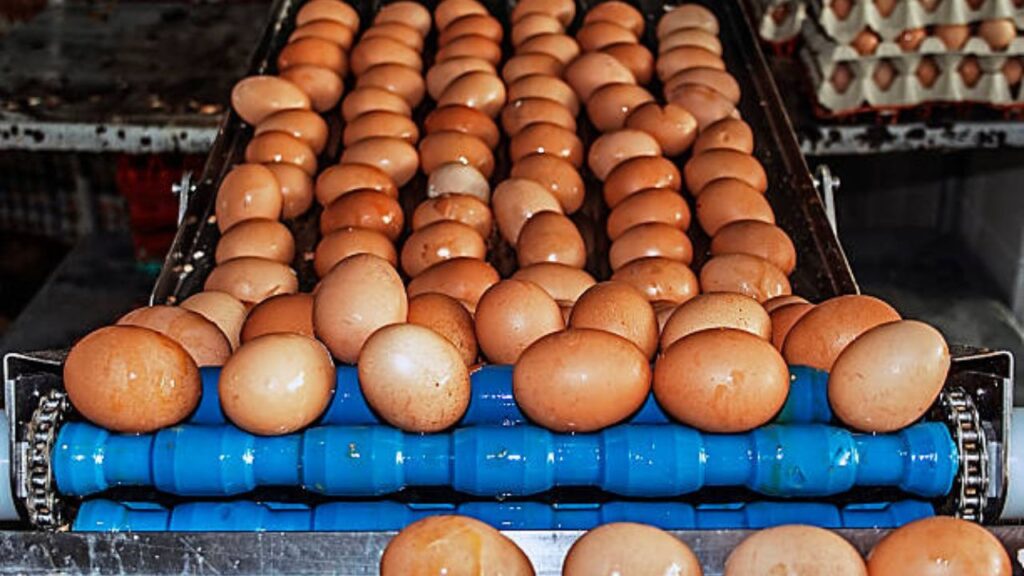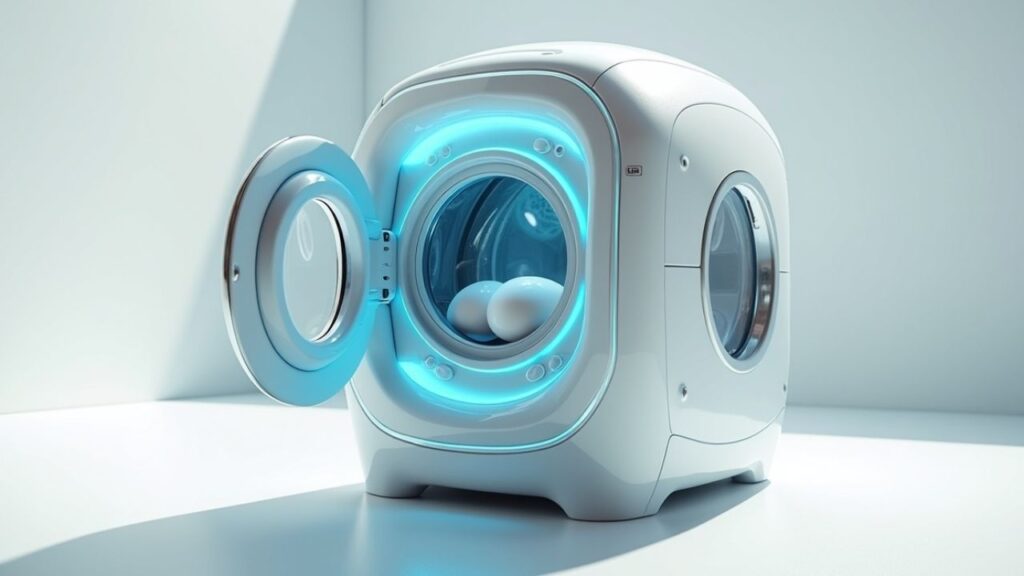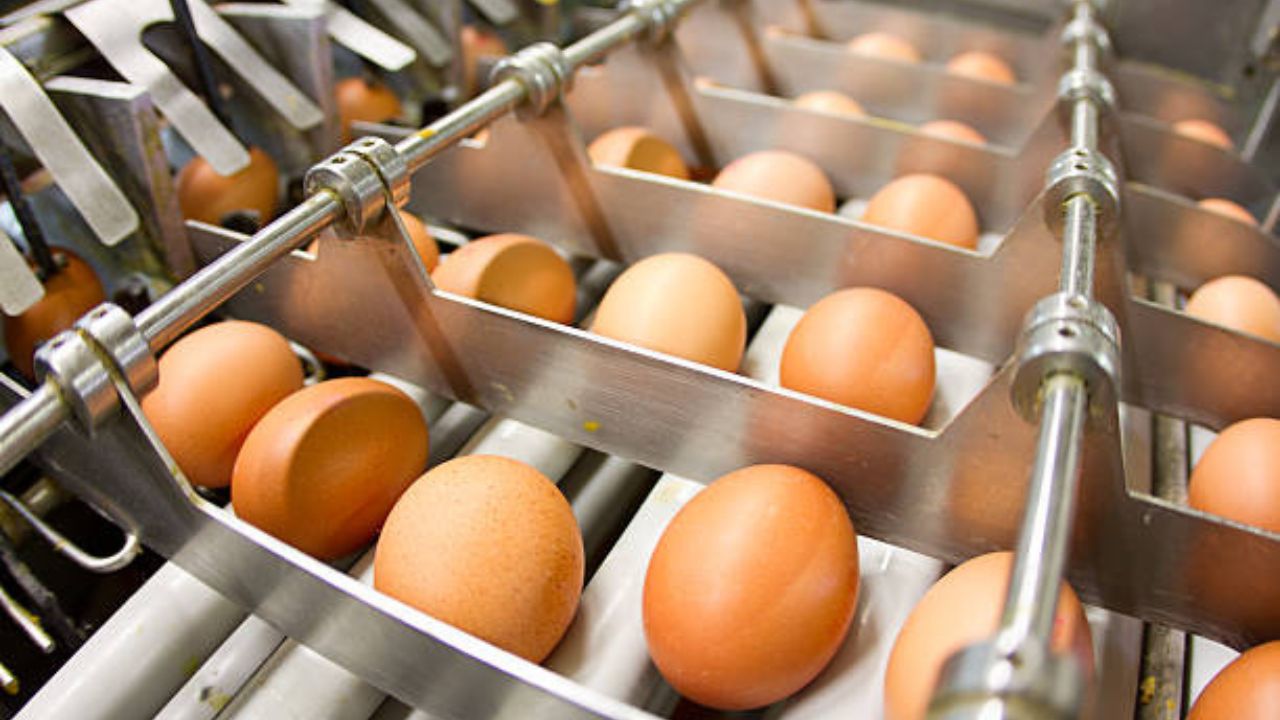Modern instruments meant to clean, sterilize, and prepare yolks for use or sale are egg dishwashers. These tools are now indispensable in food production companies, hatcheries, and poultry farms as they guarantee eggs satisfy hygienic criteria. An egg washing machine precisely automates the procedure unlike time-consuming and uneven hand washing. It gently removes trash, dirt, and germs from eggshells without breaking them. Large-scale enterprises where efficiency counts particularly benefit from this technology. Knowing how these machines operate can help you, whether you run a large company or a small farm, increase your output and quality of products. Let’s explore their characteristics, advantages, and why they are a game-changer for the sector further.

How an Egg Cleaning Machine Works
An egg washing machine guarantees complete cleanliness by running a sequence of well planned procedures. To prevent cracks, eggs are first softly piled on a conveyor belt or revolving brushes. To release dirt and organic materials, they are then doused with warm water—usually combined with food-grade detergues. Then, without damaging the shells, gentle brushes or foam rollers exfoliate them. The eggs go through a rinse process with fresh water to remove leftovers following scouring. Certain modern models have a sanitizing stage whereby mild disinfectants or UV light treats eggs to eradicate germs including Salmonella. Before being processed and packed, the eggs are last dried via air blowers or heated systems. This flawless operation guarantees that every egg is market-ready in minutes, therefore saving labor and lowering the contamination risk.
Benefits of Using an Egg Washing System
Putting money into an egg cleaning system has several benefits. First, by washing hundreds of eggs every hour, it increases efficiency much more than by hand techniques. Meeting great demand in marketplaces or grocery shops depends on this quickness. Second, it improves food safety by removing dangerous organisms capable of starting diseases. Third, clean eggs appeal more to consumers as they look better and have a longer shelf life. Long-term savings for farmers also come from lower labor expenses and less egg breakage during cleaning. Automated systems also guarantee consistency—every egg gets the same degree of cleaning—which helps consumers to develop confidence. Some devices recycle water for environmentally sensitive farms, therefore lowering waste and running expenses.
The Technology Behind Modern Egg Washers
Modern egg washers blend tenderness and efficacy with state-of- the technology. To fit varying egg sizes and dirt levels, many machines today have movable settings for water temperature, brush speed, and detergent levels. Sensors find fragile shells or fractures, then automatically remove broken eggs from the line to stop contamination. Advanced models combine IoT (Internet of Things) features so farmers may supervise the washing operation from cellphones far away. Sanitization techniques have also changed; UV-C light and ozone treatments are replacing strong chemicals, therefore rendering the procedure safer and more environmentally friendly. These developments give farmers a competitive advantage as they not only increase cleanliness but also fit with worldwide food safety rules.
Types of Egg Washing Equipment Available
Different demands call for different sized and designed egg washing equipment. Handy for home farms or startups, small-scale devices handle 100–500 eggs an hour and are compact. Designed for mid sized farms, mid-range machines handle 500–2,000 eggs hourly with additional automated drying capability. Built for big operations, industrial-grade systems generally include grading and packing duties in addition to cleaning over 5,000 eggs per hour. Perfect for areas with limited resources, there are also water-saving devices that use purified water. Certain companies provide portable devices for farmers’ markets or mobile farms. Your manufacturing volume, budget, and particular hygienic standards will all affect the appropriate kind.

Choosing the Right Egg Cleaning Device for Your Needs
Selecting the best egg cleaning tool calls for much thought. Start by looking at your daily egg output; smaller farms might not require industrial-sized machinery. See whether the machine fits egg sizes—that is, chicken, duck, quail eggs. Look for user-friendly elements including touchscreen controls or easily cleaned components. Another consideration is energy efficiency; low power or water consumption devices help to save utility costs. Reviewing reviews can help you determine durability and after-sales support; dependable customer care is essential should repairs be required. Choose a vertical or stackable construction if space is constrained. At last, evaluate costs; but, give quality and safety certifications first priority to prevent inferior goods.
Maintenance Tips for Your Egg Sanitizing Machine
Frequent maintenance keeps your egg sanitizing equipment in good functioning order. To limit bacterial growth, always empty and clean water filters, brushes, and detergent tanks following usage. Weekly wear and tear on brushes or rollers should be checked; replace them should they get frayed or stiff. Make sure water heaters run as they should and look at spray nozzles for obstructions. To prevent friction damage, lubricate moving parts including conveyor belts. To get mineral deposits off, run a monthly deep-clean cycle using vinegar or certified descaling products. When not in use, keep the machine dry, dust-free in a spot clear of clutter. Following manufacturer recommendations guarantees lifetime and constant performance.
The Future of Egg Washing Technology
With trends emphasizing sustainability and clever automation, egg washing technology seems bright going forward. Anticipated are more solar-powered devices meant to lower carbon footprints. Real-time analysis of egg quality powered by artificial intelligence might allow wash cycles to be changed depending on dirt level or shell thickness. Closed-loop water systems and biodegradable detergents will probably become the norm to reduce environmental effects. Robotics may also help load and unload eggs, therefore reducing further labor requirements. Integration of blockchain technology might also monitor the cleaning process of every egg, therefore improving customer transparency. These developments will enable quicker, greener, more dependable egg washing.
Manual Egg Washing vs. Egg Washing Machines
| Feature | Manual Egg Washing | Egg Washing Machine |
| Time Efficiency | Takes hours for small batches; labor-intensive. | Cleans 100–5,000+ eggs/hour, depending on machine size. |
| Consistency | Human error can lead to uneven cleaning or cracked eggs. | Automated process ensures every egg is cleaned uniformly. |
| Hygiene & Safety | Higher risk of contamination from improper rinsing. | Sanitizes with UV light/detergents, killing bacteria. |
| Labor Costs | Requires dedicated staff for repetitive tasks. | Reduces labor needs; one operator can manage the system. |
| Water Usage | Often wasteful; no recycling options. | Advanced models recycle water, cutting waste by 50–70%. |
| Shelf Life of Eggs | Manual drying may leave moisture, speeding up spoilage. | Quick-drying tech extends freshness and marketability. |
| Initial Cost | Cheap upfront (buckets, brushes). | Higher initial investment but long-term savings. |
Why Egg Washing Machines Are a Game-Changer
Egg washing machines aren’t just fancy gadgets—they’re practical tools that solve real-world problems. Here’s why they matter:
Food Safety First
On eggshells, salmonella and other germs can hide and compromise consumer health. Like UV light, machines utilize controlled sanitizing to destroy bacteria; hand cleaning cannot ensure this.
Boost Your Bottom Line
These devices save money over time even if their initial cost might appear high. Higher earnings follow from fewer cracked eggs, less work, and longer shelf life.
Keep Up with Demand
Consumers want consistently neat, uniform eggs. A machine guarantees that your goods look professional, thereby enabling you to compete at farmers’s markets or supermarket shops.
Planet-Friendly Practices
Eco-friendly detergents minimize chemical run-off and water-saving versions cut waste. It benefits your farm as well as the surroundings.
Future-Proof Your Farm
Automated processes keep you ahead when rules restrict and technology changes. Features like IoT monitoring or solar power simplify later updates.
Conclusion
An egg washing machine is not a luxury; rather, it is a need for farmers trying to satisfy current high requirements. From enhancing food safety to increasing output, this machinery simplifies processes and safeguards your name. These devices will get even more environmentally friendly and efficient as technology develops. Investing in an excellent egg washer guarantees you remain competitive in a quick-paced sector whether your farm is being rebuilt or upgraded. Reduced losses, happy consumers, and a better bottom line follow from cleaner eggs. Use the correct egg cleaning solution now to embrace the farming of tomorrow!
FAQ’s
1. Why should I use an egg washing machine instead of cleaning eggs by hand?
In addition to saving time, an egg washing machine guarantees regular cleanliness and lowers contamination concerns. It reduces breakage relative to hand techniques, removes dangerous pathogens like Salmonella, and manages hundreds of eggs each hour.
2. How does an egg cleaning machine work?
Gentle scrubbing with brushes, washing with warm water (and detergent), rinsing, sanitizing (UV light or disinfection), and drying follow as eggs pass phases. The method is quick, gentle on eggshells, and automated.
3. Are egg washing systems safe for all types of eggs?
Absolutely! For chicken, duck, or quail eggs most machines change the parameters. They guard fragile shells using non-abrasive cleaning techniques and food-grade detergues.
4. What should I look for when buying an egg washer?
Think through the size of your farm, daily egg yield, and budget. Look for characteristics like water economy, robustness, and fit with egg sizes. Choose models with simple upkeep and sanitizing choices.
5. How do I keep my egg washing machine in good condition?
Regular neat brushes and filters; look for wear and tear; clear spray intakes; follow maker maintenance guidelines. Every month, deep-clean to stop mineral accumulation.
